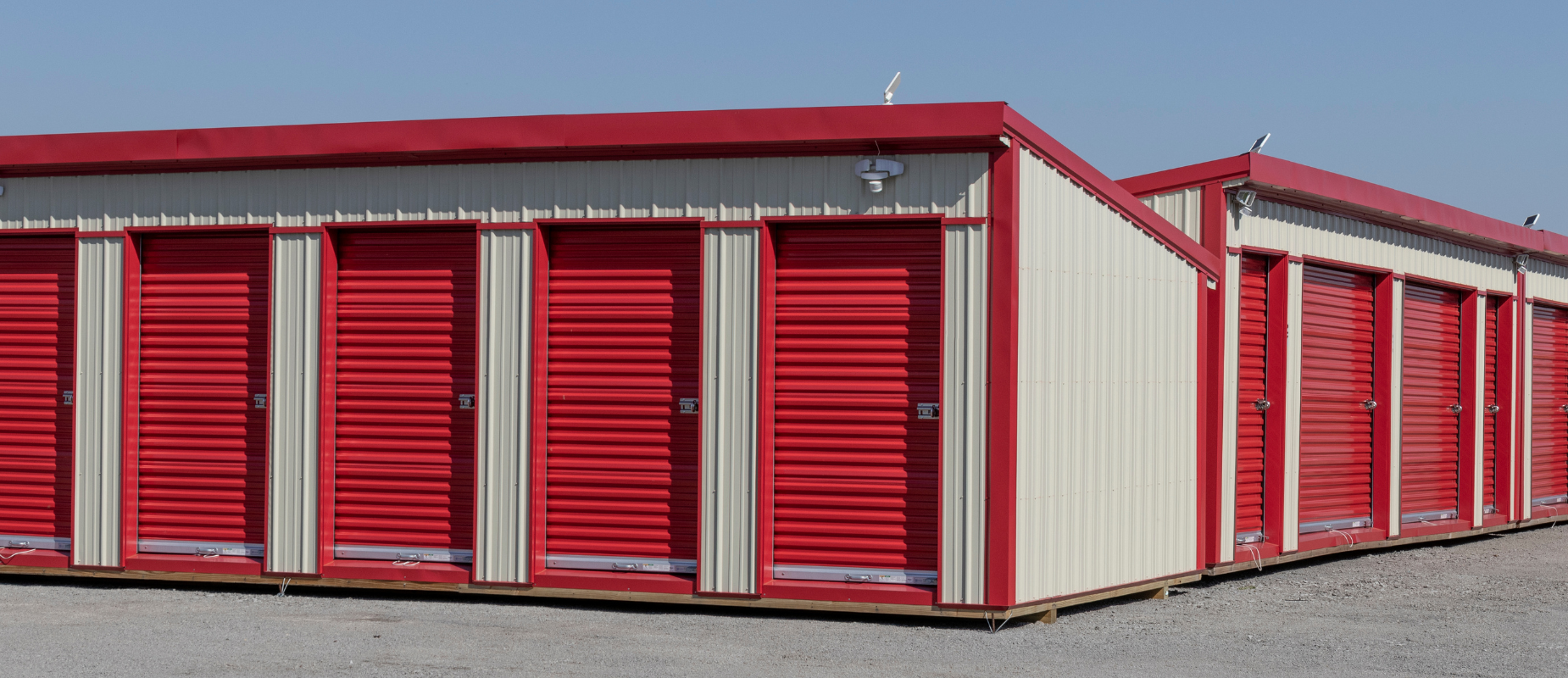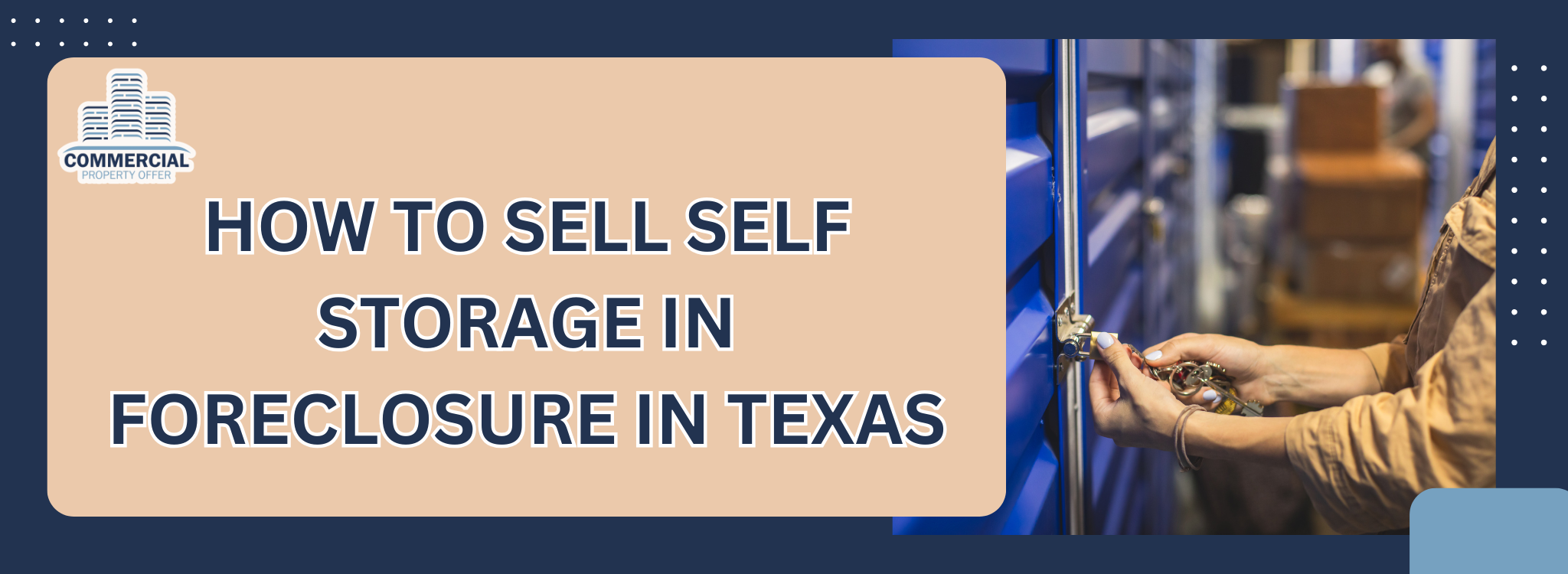
Legal Aspects of Selling Self Storage in Foreclosure in Texas

What Legal Requirements Must Be Met for Selling a Foreclosed Self-Storage Facility?
When selling a foreclosed self-storage facility in Texas, following the state’s foreclosure laws is key. Here are the main points:
- Texas Foreclosure Laws: Understand Texas foreclosure sales rules, including timelines and notification requirements.
- Self Storage Legal Compliance: Ensure your operations meet relevant self storage laws, such as tenant notification and handling abandoned property.
- Lien Laws in Texas: Know the order of liens on the property, which can affect the sale. Identify any outstanding liens before moving forward.
- Engagement with Legal Professionals: Work with an attorney experienced in foreclosure and real estate to handle legal complexities.
How Do Texas Lien Laws Affect the Sale Process?
Texas lien laws play a significant role in foreclosed property sales. Important factors include:
- Lienholder Rights in Texas: Lienholders have rights that must be addressed before the sale. Ignoring these can lead to legal issues.
- Lien Priority in Foreclosures: Understand which liens take priority during a foreclosure. Senior liens need resolution before junior ones.
- Liens and Legal Advice: Get legal advice to work with lienholders while complying with Texas regulations and avoiding disputes.
Who Can Legally Authorize the Sale of Foreclosed Self Storage Units?
Knowing who can authorize foreclosure sales is essential:
- Legal Authority for Foreclosure Sales: Usually, the power of sale in the deed of trust or mortgage gives authority to start foreclosure proceedings.
- Authorization for Sale: This might involve appointing a trustee or auctioneer from the loan documents to conduct the sale.
- Self-storage lien Enforcement: Owners must follow legal steps to enforce liens, including giving formal notice to tenants and adhering to timelines.
- Engagement with Professionals: Real estate brokers or auctioneers skilled in foreclosure sales can help ensure all actions follow legal standards.
Preparing for the Sale of Self Storage Units in Foreclosure
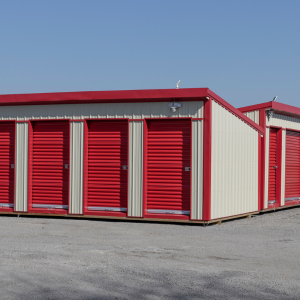
What Steps Should Be Taken Before Listing a Foreclosed Self-Storage Facility?
Before listing, you need to complete several preparation steps:
- Preparing a Foreclosed Property: Inspect thoroughly and fix maintenance issues to make the property more appealing.
- Pre-Listing Steps: Conduct a legal compliance check to align with Texas laws.
- Engagement with Commercial Real Estate Experts: Use the expertise of professionals in foreclosure sales to present the property well and reach potential buyers.
How Can Owners Best Prepare the Property for Sale Amidst Foreclosure?
Getting the property ready is key to boosting sale potential:
- Property Preparation Steps: Clean and secure units, remove debris, and ensure the building is in good condition. Consider cosmetic improvements for better appeal.
- Enhancing Sales Potential: Stage areas to show the facility’s strengths and address weaknesses.
- Management of Foreclosed Properties: If necessary, hire a property management firm to manage daily operations and keep the property in good shape.
What Documentation is Essential for a Seamless Transaction?
Having the proper documents organized is crucial for a smooth transaction:
- Essential Documents for Foreclosure Sales: Include the deed of trust, notices of default, and tenant notifications.
- Transaction Documentation: Ensure all contracts are accurately drafted and reflect agreed terms.
- Foreclosure Sale Paperwork: Keep records of legal notices, communications with lienholders, and auction details organized.
- Legal Advice on Documentation: Consult legal counsel to confirm that all documents meet regulatory standards and support a valid transaction.
Marketing Strategies for Selling Foreclosed Self-Storage Facilities
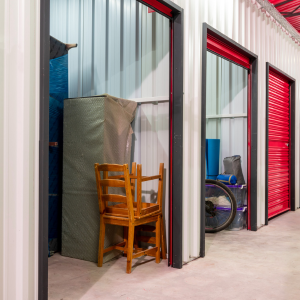
Effective marketing of foreclosed self-storage facilities requires a clear strategy focused on foreclosure property marketing. Specific marketing strategies can enhance visibility and attract potential buyers in the commercial real estate market.
- Foreclosure Property Marketing: Showcasing the potential returns of foreclosed properties can attract buyers interested in investment. Data can be used to craft messages that highlight affordability and investment opportunities.
- Advertising Self Storage Auctions: Advertise across various channels, including online platforms and industry publications. Highlight auction dates and property features to draw interest from serious bidders.
- Commercial Real Estate Market Trends: Keep up with commercial real estate market trends. Use this data to shape marketing strategies that address valuation, demand, and growth prospects.
- Increasing Visibility: Improve online listings with quality images and detailed descriptions. Use virtual tours to engage buyers and offer a complete view of the property’s potential.
Auctioning Self-Storage Units in Texas
Auctioning self-storage units in Texas involves following strict storage unit auction rules and public auction regulations to maintain legal compliance.
- Storage Unit Auction Rules: Understand the guidelines for auctions, including notifying delinquent tenants and handling paperwork.
- Public Auction Regulations: Conduct auctions publicly and follow Texas auction permits to keep the process fair and legal.
- Auctioneer Licensing in Texas: Hiring a licensed auctioneer ensures legal compliance. Verify their license and knowledge of Texas lien laws.
- Legal Compliance with Lien Laws in Texas: To avoid legal issues, follow state lien laws for notifying tenants and conducting sales.
- The Auction Process: Outline each auction step, from notifications to bidding. Provide clear information to help buyers participate.
These strategies ensure auctions align with best practices and legal standards, protecting operators and buyers. Following these methods improves the sale of foreclosed self-storage facilities.
Negotiating with Potential Buyers of Foreclosed Storage Units

Negotiation is essential when selling foreclosed storage units. A real estate broker or lawyer can help ensure that transactions run smoothly and that best practices are followed during foreclosure auctions. Sellers must pay close attention during the bidding process to secure competitive offers. Strategic planning and clear communication are also required for successful foreclosed storage unit sales.
How Should Sellers Approach Negotiations in a Foreclosure Context?
In foreclosure negotiations, sellers must consider several factors. A fair contract must reflect market conditions and expected pricing. Setting appropriate auction reserve prices prevents underselling. Effective foreclosure property marketing entails reaching out to potential buyers through legal channels. Understanding lienholder rights, particularly in Texas, can help avoid legal issues.
What Are Common Challenges When Negotiating Foreclosure Sales?
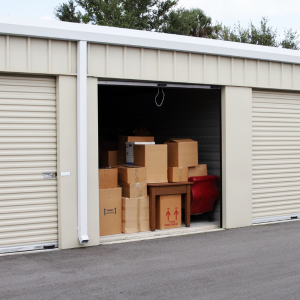
Challenges in foreclosure sales include:
- Risks: Evaluating financial risks associated with each buyer.
- Cash Offers: Handling cash transactions to ensure legality.
- Legal Advice: Consulting legal experts for foreclosure dispute resolution.
- Tenant Default Remedies: Resolving tenant issues that could affect the sale.
- Advertising: Competing through targeted foreclosure sale advertising.
How Can Sellers Receive a Fair Offer?
To get a fair offer, sellers should:
- Hire an attorney with expertise in real estate and current market trends.
- Understand foreclosure redemption rights and lien priority.
- Actively participate in the auction process specific to storage facilities.
Post-Sale Obligations and Considerations
After a foreclosure sale, sellers have several responsibilities:
- Ownership Transfers: Ensure contracts are in place for title transfer procedures.
- Tax Implications: Plan for the tax implications of storage sales accordingly.
- Lien Sale Timing: Consider timing for lien sales to maximize returns and minimize liabilities.
What Happens After the Sale of a Foreclosed Self-Storage Facility?
Following the sale of a self-storage facility:
- Property Management: Adhere to contract terms and complete title transfer procedures.
- Auction Proceeds: Handle proceeds according to public auction recording requirements.
- Compliance: Fulfill all legal obligations under applicable property codes.
What Are the Tax Implications for Sellers Following a Foreclosure Sale?

First, one must understand post-sale tax and financial ramifications. Seeking legal counsel on tax matters helps one plan properly. Then, funds distribution should be managed effectively using auction escrow services, and lienholders must be notified quickly to prevent penalties.
Are There Any Compliance Checks Required Post-Sale?
Legal issues cannot be avoided by post-sale compliance unless it is perfect. Use Texas property code compliance for self-storage facilities to guarantee all sale features satisfy legal criteria. Correct execution and documentation
Understanding Foreclosure Timelines and Procedures
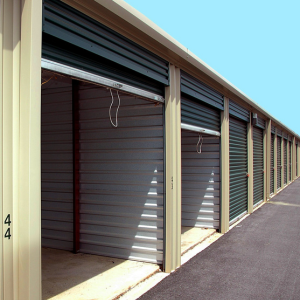
Foreclosure is a detailed legal process with several steps and timelines that can vary widely, especially by state. In Texas, foreclosure follows specific state laws that outline the process’s progress. Knowing the typical timeline and procedures is essential for property owners and storage facility operators.
What Is the Typical Timeline for the Foreclosure Process in Texas?
In Texas, foreclosures are usually non-judicial unless stated otherwise. The typical timeline includes:
- Default Notice: This notice is sent after a missed payment, starting the foreclosure process.
- Notice of Sale: The lender must provide this notice at least 21 days before the sale date. It should be filed with the county clerk and sent to the borrower via certified mail.
- Foreclosure Sale: Sales occur on the first Tuesday of the month following the notice period.
Understanding these steps helps stakeholders plan and explore options during each stage.
How Does a Foreclosure Affect the Timing of a Sale?
Foreclosure timing can greatly influence marketability and recovery for creditors. Important considerations include:
- Notice Periods: Required notices can delay sales.
- Market Conditions: Changes in the real estate market can affect how quickly properties sell.
- Legal Challenges: Disputes may prolong the process, affecting the sale timing.
Strategic planning and legal advice are key to handling these complexities effectively.
What Legal Protections Exist for Owners During Foreclosure?
Texas provides several legal protections for property owners facing foreclosure:
- Right to Cure: Owners can resolve defaults until the foreclosure sale happens.
- Notice Requirements: Borrowers must receive proper notice of foreclosure actions.
- Deficiency Judgments: Limits exist on what lenders can claim if a sale doesn’t cover the full debt.
Consulting legal professionals helps property owners understand their rights and available remedies.
Financial Considerations for Selling Foreclosed Properties

Managing foreclosed property sales requires an understanding of financial aspects. Correct valuation, documentation, and financing options are crucial to maximizing returns and facilitating smooth transactions.
How Is the Value of a Foreclosed Storage Facility Assessed?
Valuing a foreclosed self-storage facility involves:
- Market Analysis: Compare similar local properties to assess market value.
- Condition and Occupancy Rates: Examine the facility’s condition and how occupied it is.
- Income Potential: Estimate income based on rental rates and demand.
Professional appraisals and real estate expertise improve valuation accuracy.
What Financial Documentation Should Be Prepared for Potential Buyers?
Thorough financial documentation attracts potential buyers of foreclosed properties. Important documents include:
- Financial Statements: Detailed balance sheets and income statements.
- Tax Records: Recent filings showing the property’s financial history.
- Loan Documentation: Clear records of current loans and obligations.
Preparing these documents properly ensures transparency and builds buyer trust.
Are There Financing Options Available for Buyers of Foreclosed Units?
Buyers often look for financing options, which may include:
- Traditional Mortgages: Standard loans from financial institutions.
- Hard Money Loans: Short-term financing suitable for quick transactions.
- Owner Financing: Sellers provide direct financing to buyers.
Each option has different terms, so buyers should seek financial advice to choose wisely.
Avoid the complexities of foreclosure. Commercial Property Offer buys properties directly for cash, providing a quick, hassle-free solution. Contact us today for expert guidance on your options in Texas!
Engaging Professional Assistance in Self Storage Foreclosure Sales

Involving experts in self-storage foreclosure sales is essential for adhering to legal obligations and optimizing returns. An experienced commercial real estate expert or broker and knowledgeable legal counsel can facilitate a more efficient process. These specialists comprehensively understand Texas foreclosure laws and offer insights on property management and advertising strategies pertinent to storage facility foreclosure processes. Effective advertising for foreclosure sales is essential for attracting committed buyers and complying with regulatory requirements.
Why Is It Beneficial to Hire a Real Estate Attorney for Foreclosure Sales?
A real estate attorney is essential for foreclosure sales. Their team provides specialized legal counsel on dispute resolution and guarantees adherence to lien regulations in Texas. Their expertise in Texas Property Code Compliance safeguards the rights of lienholders. Real estate attorneys assist in navigating intricate legal challenges, ensuring that all actions comply with the law and that potential risks are mitigated.
How Can a Commercial Real Estate Expert Assist in Selling Foreclosed Storage Facilities?
A commercial real estate expert is pivotal in marketing and selling foreclosed storage facilities. Their expertise in Texas foreclosure laws facilitates smooth transactions. Real estate experts collaborate with property auction companies to execute efficient marketing strategies. Their management of the auction process guarantees that properties attain optimal visibility, thereby enhancing the probability of a successful sale.
What Role Do Property Management Companies Play in the Sale Process?
Property management firms play a vital role in the foreclosure sale process. Their responsibilities include managing storage facility foreclosure procedures, addressing tenant default remedies, and overseeing evictions. These organizations guarantee that auction proceeds are managed and allocated appropriately. Their efforts ensure the smooth operation of the facility, increasing its attractiveness to prospective buyers.
Alternative Solutions for Owners Facing Foreclosure
For owners facing foreclosure, there are several alternatives available in Texas:
- Negotiation with Lenders: Discuss possible loan term modifications.
- Foreclosure Solutions in Texas: Exploring refinancing or debt restructuring options.
- Legal Advice: Understanding lienholder rights and dispute resolution options.
These alternatives offer pathways for owners to retain ownership or minimize financial losses.
Are There Viable Alternatives to Selling for Owners?
Owners have alternatives to selling foreclosed properties:
- Exploring Repayment Plans: Collaborating with lenders on manageable payment schedules.
- Utilizing Foreclosure Redemption Rights: Reclaiming property within specified timeframes under Texas laws.
- Adhering to Lienholder Notification Procedures: Informing all parties to prevent unnecessary sales, potentially.
How Can Owners Work with Lenders to Avoid Foreclosure?
To avoid foreclosure, owners should consider:
- Foreclosure Solutions in Texas: Utilizing state-specific programs for distressed property owners.
- Collaborating on Restructuring Agreements: Modifying loan terms in agreement with lenders.
- Prioritizing Tenant Default Remedies: Addressing lease violations to maintain cash flow and satisfy lender demands.
Open communication with lenders can lead to mutually beneficial arrangements that prevent foreclosure proceedings.
What Assistance Programs Exist for Owners Struggling with Foreclosure?
Several assistance programs in Texas help owners struggling with foreclosure:
- Government-Funded Programs: Providing financial support and guidance.
- Foreclosure Assistance Programs: Offering legal and financial advice tailored to individual circumstances.
- Legal Advice: Understanding Texas foreclosure laws and redemption rights.
These programs offer vital support to prevent foreclosure or facilitate a smooth transition if selling becomes necessary.
FAQs:
What Are the Foreclosure Options for Self-Storage Facilities in Texas?
Self-storage owners in Texas facing foreclosure can explore several strategies. Options include debt restructuring, negotiating settlements with lienholders, or considering a short sale. Consulting with a legal expert can also provide solutions that align with Texas foreclosure laws.
What is the Foreclosure Process for Self-Storage Facilities in Texas?
The Texas foreclosure process includes notifying borrowers of default, providing a grace period to address the default, and conducting a public auction. Operators must understand their rights and obligations under both state and federal guidelines.
How Can Self-Storage Owners Market Facilities Under Foreclosure?
To effectively market foreclosed self-storage facilities, owners should highlight unique selling points, use diverse advertising channels, and target investors interested in distressed properties. Understanding local demographics can also improve marketing strategies.
Are There Specific Foreclosure Solutions Available in Texas for Real Estate Investors?
Yes, Texas offers solutions like loan modifications, short sales, and the opportunity to purchase properties at foreclosure auctions. Working with an experienced attorney or financial advisor can help investors choose the best approach.
What Should One Consider When Investing in Texas Properties Under Foreclosure?
Investors must understand lienholder rights, evaluate the property’s profitability, and research the local real estate market. Conducting due diligence, including checking repair and maintenance needs, is crucial for maximizing returns.
How Does the Lienholder Notification Procedure Work in Texas?
In Texas, lienholders must be formally notified before a foreclosure sale. This involves sending a notice of the pending foreclosure to ensure all parties know their rights, which is crucial for avoiding disputes.
What Are the Tenants’ Default Remedies Available in Self Storage Foreclosures?
Remedies for tenant default can include eviction, payment plans, or auctioning storage unit contents. To ensure legal compliance, operators must comply with Texas laws regarding public notice and lien sale timing.
How Can Technology Aid in Managing Self Storage Foreclosure Proceedings?
Technology can streamline foreclosure tasks such as advertising, customer outreach, and organizing auctions. Software solutions can improve efficiency and accuracy in these processes.
Key Insights
- We ensure tenant default remedies comply with Texas law, addressing the storage unit eviction process and lienholder rights.
- Understanding foreclosure redemption rights is key; we offer expertise in lien sale timing and Texas storage lien exemptions.
- Our team supports real estate foreclosure guidelines, manages auction proceeds, and advertises foreclosure sales.
- Hiring an auctioneer in Texas involves knowing auction best practices and handling the tax lien effects of the storage unit.
- Meeting public notice requirements and lienholder notification procedures is crucial for successful bidding on storage units.
- Our strategies include customer outreach for auctions and unique selling points to boost demand and profitability.
- We guide portfolio investment decisions in various MSAs, such as Tucson, AZ, Cape Coral-Fort Myers, Fresno, CA, and Syracuse, NY.
- Demographics and investing insights are vital for optimizing real estate in areas like Live Oak and Bolton.
- Our expertise covers repair and maintenance management, ensuring advertisements and technology investments are effective.
- We clarify the self-storage auction process and foreclosure dispute resolution, enhancing legal compliance and efficiency.
This information applies to Texas and all its cities. At Commercial Property Offer, we buy all types of commercial property across the United States, including California, Illinois, New York, and Arizona. Contact us at (855) 806-3337 or visit our website to get started!
Get An Offer Today, Sell In A Matter Of Days
We Buy Commercial Property Fast, Making It Easy to Sell Your Commercial Property In Any Condition. No Commissions, No Repairs, No Delays. Pick Your Closing Date and Fill Out the Form Below.

